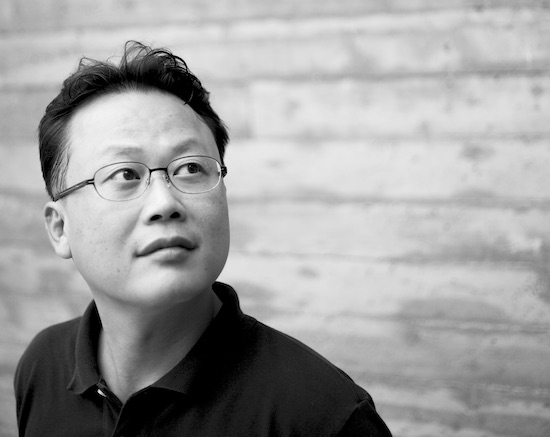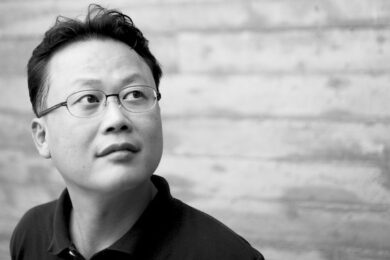Photo credit: Dahuim Paik
“What matters is never the shooter, but the person behind the shooter.”
The Plotters is the first novel from acclaimed Korean author Un-Su Kim to be translated into English. The inimitable Sora Kim-Russell, who has also translated the works of Hwang Sok-yong (At Dusk, Familiar Things), allows Kim’s graceful prose to retain its charm and vibrancy and ensures that this edition is an eloquent match for the original text.
Un-Su Kim has been a prominent name in Korean literature for years – in 2006 he won the Munhakdongne Novel Prize, Korea’s most prestigious literary prize – and has long been heralded as a master story teller. Celebrated for his sharp insights into the human condition and his deep love for mankind, with The Plotters Un-Su Kim has given the world a deeply poetic example of Korean Noir.
This is not a dyed-in-the-wool assassin story and Kim makes that clear from the outset. The opening chapter brings us an old man talking to his flowers on a mountainside accompanied by a huge dog named Santa, an unlikely friendship struck in the dead of night, and a meandering yarn about one man’s destiny, entwined in a relationship with a whale he once tried to kill. The Plotters is full of such delightfully surreal twists and turn, delivering a fine balancing act between thriller and contemporary literature that Kim manages with skill throughout.
Rather than the sexy, overtly glamorous life of assassins often portrayed in popular culture, Kim gives us a world in which bills still need to be paid and job security is fleeting at best. The story follows world-weary protagonist, Reseng, a thirty-two-year-old assassin living in Seoul. Reseng lives his life following the exact orders of the plotters, mysterious criminal masterminds who devise and dictate to the assassins exactly how each hit is supposed to go down. To deviate is risk one’s own life, and Reseng has no illusions that he will one day end up on a kill list too. There is an appealing philosophical tint to the coolness with which Reseng appraises his chances of survival.
“The most dangerous adversary was a pazzo, a madman. A person who thought they had nothing to lose, who wanted nothing from others and asked nothing of him- or herself, who behaved in ways that defied common sense, who quietly followed her or his own strange principles and stubborn convictions, which were both inconceivable and unbelievable.”
Found in a bin as a baby and raised by Old Racoon, a cantankerous bibliophile who runs a decrepit library (The Doghouse) that also acts as a base of operations for the city’s assassins, Reseng has known no other life and manages his growing despair by getting drunk on beer and playing with his cats – named Desk and Lampshade – each time he completes a job. However, Reseng’s orderly if unsatisfying life is thrown into chaos when he refuses to follow orders on a job and consequently finds his apartment ransacked and a bomb in his toilet.
Caught between Old Racoon and Hanja, a former assassin who has set himself up as competition with Doghouse in response to the formation of the new Korean government, Reseng becomes ever more disillusioned with their way of life. When his best friend Jeongan is taken out, Reseng breaks away from the world he has known to strike out alone in search of justice. His determination to uncover the identity of the plotters becomes one of self-discovery and personal growth.
There is a unique blend of fatalism and ruthless violence seamlessly woven throughout The Plotters which becomes a comforting authorial signature as Kim quietly and unflinchingly leads us through his re-imagined Seoul underworld. The ultimate effect is a thought-provoking satirical critique of a Korean society where everything is for sale and everyone is corrupt.
“Ironically the overthrow of three decades of military dictatorship, a return to democratically elected civilian presidencies, and the brisk advent of democratization led to a major boom in the assassination industry.”
Whilst such political subject matter can lend novels a stiff gait as the reader picks their way through bureaucratic undertones, The Plotters is anything but stiff. As the novel progresses, Kim creates a cast of memorable characters, his finely crafted prose elevating even the most ordinary, and produces a story infused with humour that is in turn quirky (“…’You think a few lousy anchovies can make up for telling me to stab Old Racoon in the back?’ Minari looked shocked as he scrambled to pick up the bag. ‘Don’t you know how expensive these are?’ he muttered…”) and startlingly dark. Imagine if Chad Stahelski’s John Wick was spliced with Haruki Murakami’s Norwegian Wood and you may find yourself in the same ballpark… or misused pet crematorium.
Intelligent and thoughtful throughout, The Plotters acknowledges the tropes of crime novel and thriller, weaving in power and revenge as motivators throughout, but pressing past them to focus on the individuals whose lives are entangled. Self-actualisation, love, justice, and personal sacrifice are all central to the plot of this novel. Its timeless themes and Kim’s exquisite ability to turn even the most gruesome violence into something unnervingly beautiful makes The Plotters a novel that will linger in the mind long after the story is over.
The Plotters by Un-Su Kim is published by HarperCollins



